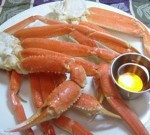
Snow crab fishery achieves milestone
By Food in Canada staff
Business Operations Food TrendsThe Scotian Shelf Snow crab trap fishery has become the first in North America to receive Marine Stewardship Council certification
Halifax, N.S. – Marine Stewardship Council (MSC), which works with partners to encourage sustainable fishing practices, has certified North America’s first snow crab fishery.
The Scotian Shelf snow crab trap fishery announced its involvement in the MSC program in June 2011, reports SeafoodSource.com. The MSC client is the Affiliation of Seafood Producers of Nova Scotia (ASPANS).
Also undergoing MSC assessment in Atlantic Canada is the Newfoundland and Labrador snow crab fishery, which was entered by the Association of Seafood Producers this past May.
Scotian Shelf
The Scotian Shelf is an area that lies along south Nova Scotia. The commercial season for snow crab largely occurs in two major areas, from April to September on the eastern portion of the shelf and from November to March on the western portion.
The FishSite.com reports that approximately 203 commercial licenses are issued to individuals and vessels that are under 65 feet in length. First Nations groups receive communal, commercial licenses.
The product is processed into crab leg sections and crab meat products and supplied in frozen form to markets primarily in Japan and the U.S. The Canadian Department of Fisheries and Oceans manages the fishery.
Effective controls
ASPANS says the Scotian Shelf will now provide up to 10,000 tonnes of MSC-certified snow crab to clients each year. “Through effective effort controls, escape mechanisms for undersize and  female crab and conservative management practices the stock is stable and reproductive capacity is strong,” says Peter Norsworthy, executive director of ASPANS.
female crab and conservative management practices the stock is stable and reproductive capacity is strong,” says Peter Norsworthy, executive director of ASPANS.
“MSC certification permits our member companies to differentiate our products from others while positioning the fishery as a model for responsible shellfish management practices. This certification assures the eco-conscious consumer they are buying a product that is harvested in a sustainable and responsible manner.”
Global Trust, now part of SAI Global Assurances Ltd., conducted the independent, third-party assessment to the MSC standard. The assessment found that bycatch is very low. The certifier did apply two improvement actions to the certification, says the FishSite.com. One says limit and target reference points should be established to verify the stock is maintained at a level consistent with Bmsy, the biomass that can support maximum sustainable yield. The second relates to formal adoption of the harvest control rules consistent with reference points. Over the five-year life of MSC certification, progress against these conditions will be tracked and available for public review in annual surveillance audits.
Print this page